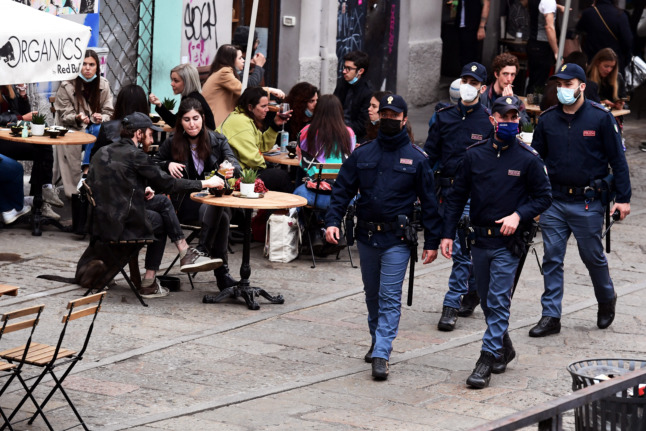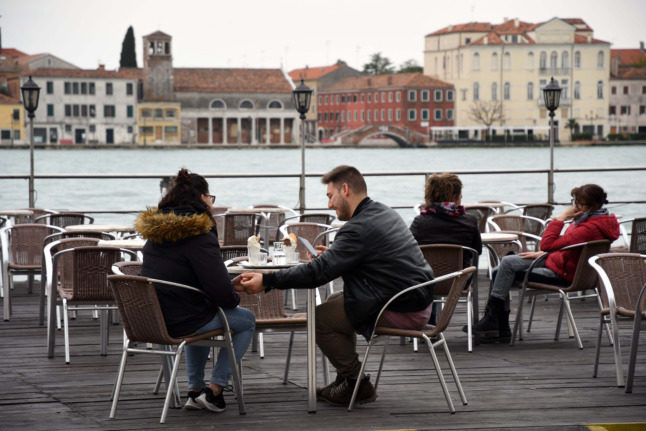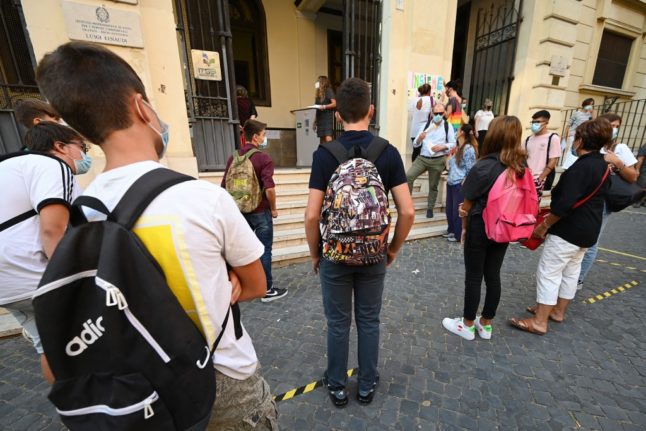This article was last updated on Tuesday, February 1st.
Italy’s Covid infection rate may have peaked, but that doesn’t mean the government is easing up on health restrictions just yet. In fact, some tightened restrictions are set to come in from Tuesday, February 1st.
Basic ‘green pass’ required in non-essential shops
As of Tuesday, customers show a ‘basic’ version of Italy’s green pass to enter banks, post offices, public offices, tobacconists, bookshops, newsagents (except outdoor kiosks) and shopping malls, according to a decree signed by Prime Minister Mario Draghi on January 21st.
The basic version of the pass is already a requirement for entry to hairdressers, barbers, and beauty salons.
These rules are in addition to the existing requirement of a ‘super’ green pass on all forms of public transport, in bars and restaurants, gyms, hotels, cinemas, theatres and sports stadiums.
Italy currently has a two-tiered green pass system in place, with the basic version of the pass available to those who test negative, alongside the ‘reinforced’ or ‘super’ green pass which proves the bearer is vaccinated against or has recovered from Covid-19.

The basic green pass can be obtained via vaccination, recovery, or a negative test from a pharmacy carried out in the preceding 72 hours (for PCR tests) or 48 hours (for rapid tests).
“Essential” businesses “related to essential and primary needs”, such as supermarkets and food stores, pharmacies, opticians, and shops selling fuel, animal food, and specialised medical equipment are exempt from the requirement, according to the text of the decree.
Vaccine pass validity reduced from nine to six months
February 1st also sees the validity of Italy’s ‘super’ or ‘reinforced’ green pass, which can be obtained only through vaccination or recovery from Covid, reduced from nine to six months.
While Italian media reports that the government is considering extending the validity of the pass indefinitely for those who have had a third or booster dose, this change has still not been confirmed as of Tuesday morning and the government has not made any official statement on the issue. (We will update this article with new information following any changes.)
The ‘super green pass’ is currently required to access most venues and services in Italy, including public transport, restaurants and bars, hotels, cinemas, tourist and cultural sites, cinemas, concerts, sporting events and sports facilities.
READ ALSO: Q&A: How will Italy’s new six-month Covid vaccine pass validity work?
The managers of these facilities are responsible for conducting checks, and businesses caught failing to enforce the rules face a fine of between 400 and 1,000 euros – as do any users found in these places without the pass.
Fines for unvaccinated over-50s
Following a January 5th government decree which imposed an immediate vaccine mandate on over 50s in Italy, a 100 euro fine kicks in from February 1st for all those in the age bracket who remain unvaccinated by this date.
The sanction applies not just with regard to first doses, but also for anyone who as of February 1st has failed to complete their primary vaccination cycle ‘in accordance with the instructions and within the time provided by circular of the Ministry of Health’ or get their booster dose within a stipulated time frame, the decree says.
According to the news daily il Quotidiano, that means that anyone in the age bracket who has gone more than six months since receiving their last shot would be in violation of the mandate – even if they have completed the primary vaccination cycle.
READ ALSO: Over-50s in Italy without Covid booster face 100 euro fine
The “one-off” 100-euro fines will be collected “automatically” by Italy’s Agenzie delle Entrate (Inland Revenue-Recovery Agency) based on data passed on from the country’s national health system, the health ministry confirmed on its official vaccination information site.
Those who are notified that they are in violation of the rules have ten days to communicate the reason for their vaccination status to their local health office (Azienda sanitaria locale or Asl).
The mandate is in place in the first instance until June 15, 2022, and applies to anyone due to turn 50 by that date.
Nightclubs and dance venues to reopen?
Italy shut down nightclubs and dance venues shortly before Christmas as Covid infection rates soared over the festive period.
That ban has now been extended until at least February 10th, along with the country-wide outdoor mask mandate.
Changes to international travel rules
Italy’s international travel rules expire on January 31st. On January 27th, Health Minister Roberto Speranza signed an ordinance containing the entry rules that will apply from February 1st until March 15th.
READ ALSO: How do Italy’s international travel rules change from February 1st?
For arrivals from within the EU, the government has confirmed travel restrictions will be relaxed from the start of February: anyone travelling to Italy from within the bloc will need only a basic ‘green pass’ health certificate or its equivalent, which can be obtained via vaccination, recovery, or a recent negative Covid test, to enter the country without a self-isolation requirement.
Up till now, travellers entering Italy from within the EU have required both a ‘super green pass’, that proves the bearer is vaccinated or recovered from Covid, and a recent negative test result to avoid a five-day quarantine on arrival.
For arrivals from all other countries, the ordinance states that the existing rules will be extended another six weeks.
That means arrivals from countries on the government’s List D can continue to enter Italy without a quarantine requirement provided they can produce both a vaccination certificate and a recent negative test; while entry from any of the countries on its List E is permitted only under specific circumstances, and comes with a ten day self-isolation requirement.
The Local will continue to update this article and report changes to the travel restrictions when more information becomes available. Please see our homepage or travel news section for the latest updates.



 Please whitelist us to continue reading.
Please whitelist us to continue reading.